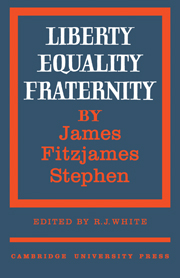 Liberty, Equality, Fraternity by James Fitzjames Stephen, 271 pages
Liberty, Equality, Fraternity by James Fitzjames Stephen, 271 pages
In Liberty, Equality, Fraternity, James Stephen evaluates the revolutionary catchphrases and finds that they admit of both a broad interpretation, in which they lack any real content and are little more than empty slogans, and a narrower meaning, in which they are erroneous in their premises and pernicious in their consequences. Acting as both the spur to and the primary target of Stephen's criticism is John Stuart Mill, whose landmark work On Liberty Stephen read and reread on the long voyage back to Britain from India, where he had held a post in the colonial administration. This is not an incidental fact - Stephen's observations begin with his rejection of Mill's smug assumption that while lesser peoples might require strong paternalistic government, Western Europeans are amply prepared for a regime of pure freedom. Central to Stephen's worldview is his conclusion that all law is ultimately an expression of morality, and that morality depends on metaphysical and theological claims, even if those claims are purely negative. It is in this light that he denounces the religiously and morally neutral state Mill proposes as an illusion. Stephen reveals that, despite his pretence of neutrality, Mill is making moral claims, they are only hidden, undeveloped, and inadequate.
Nearly two hundred years later, it would be easy to conclude that, given Mill's continuing reputation and Stephen's obscurity, history has judged in Mill's favor, but this would require foolishly assuming that history only moves in one direction and never revisits her judgments.
No comments:
Post a Comment